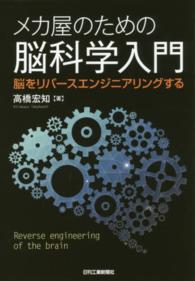- ホーム
- > 洋書
- > 英文書
- > History / World
Full Description
Studying change in the course of human history, in different places, through the lens of a diverse set of core themes, World History for International Studies offers readers a set of windows into different debates historians have been conducting. Key themes, such as communication, trade, order, slavery, religion, war, identity, modernity, norms and ecology, are linked to specific world regions, which tell a story about how local ideas and individual contacts developed, started to overlap and became globally understood and used by ever larger groups of people. These themes are brought to life by a diverse set of key primary sources, such as a book, a letter, a medal, a temple and an epic, to showcase how historians have used sources to tell these stories and conduct debates. The book provides an introductory resource into the study of history and includes detailed suggestions for further study.
Contents
Preface and Acknowledgements
Foreword
Guide to Reading
About the Contributors
Introduction; What is World History? (Isabelle Duyvesteyn)
Introduction Part I: The Pre-Modern World > 1800 CE Communication; The Writing Revolution (Anne Marieke van der Wal)
Trade: The Ancient Silk Roads (Richard Griffiths)
Political Order: From Coercion to Constitution (Brian Shaev)
Slavery: Capitalism & Racism (Joris van den Tol and Anne Marieke van der Wal)
Religion; Perspective and Practice ( Jochem van den Boogert)
Introduction Part II: The Modern World < 1800 CE War; Disordering and Ordering (Isaac Scarborough)
Identity; From Traditional to Transnational (Arnout van Ree)
Modernity; Being Modern in a Changing World (Gina van Ling)
Human Rights; Norms and Policy (Mike Schmidli)
Ecology; From Local Resistance to Global Concern (Elisa Da Via, Judith Naeff and Anne Marieke van der Wal)
Conclusion; World History Today (Isabelle Duyvesteyn and Helen Steele)
Illustration credits
Index








